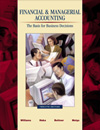

 Financial and Managerial Accounting: The Basis for Business Decisions, 12/e The Accounting Cycle: Capturing Economics Events Multiple Choice Quiz |
 2002 McGraw-Hill Higher Education
2002 McGraw-Hill Higher EducationAny use is subject to the Terms of Use and Privacy Policy.
McGraw-Hill Higher Education is one of the many fine businesses of The McGraw-Hill Companies.